| Listing 1 - 9 of 9 |
Sort by
|
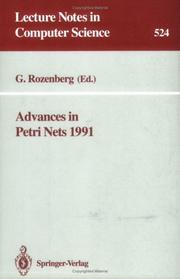
ISBN: 3540543988 0387543988 3540476008 Year: 1991 Volume: 524 Publisher: Berlin Heidelberg London Springer-Verlag
Abstract | Keywords | Export | Availability | Bookmark
 Loading...
Loading...Choose an application
- Reference Manager
- EndNote
- RefWorks (Direct export to RefWorks)
The main idea behind the series of volumes Advances in Petri Nets is to present to the general computer science community recent results which are the most representative and significant for the development of the area. Thepapers for the volumes are drawn mainly from the annual International Conferences on Applications and Theory of Petri Nets. Selected papers from the latest conference are independently refereed, and revised and extended as necessary. Some further papers submitted directly to the editor are included. Advances in Petri Nets 1991 covers the 11th International Conference on Applications and Theory of Petri Nets held in Paris, France in June 1991. The volume contains the Bibliography of Petri Nets 1990 prepared by H. Pl}nnecke and W. Reisig, with over 4000 entries.
Computer architecture. Operating systems --- Petri nets --- Machine theory --- Réseaux de Pétri --- Automates mathématiques, Théorie des --- Congresses --- Congrès --- Réseaux de Pétri --- Automates mathématiques, Théorie des --- Congrès --- Computer science. --- Computer Communication Networks. --- Mathematics. --- Computer software. --- Logic design. --- Computation by Abstract Devices. --- Applications of Mathematics. --- Algorithm Analysis and Problem Complexity. --- Logics and Meanings of Programs. --- Processor Architectures. --- Design, Logic --- Design of logic systems --- Digital electronics --- Electronic circuit design --- Logic circuits --- Switching theory --- Software, Computer --- Computer systems --- Math --- Science --- Informatics

ISBN: 3540539824 0387539824 0387539816 3540539816 3540464999 3540465634 Year: 1991 Volume: 493-494 Publisher: Berlin Heidelberg Paris Springer-Verlag
Abstract | Keywords | Export | Availability | Bookmark
 Loading...
Loading...Choose an application
- Reference Manager
- EndNote
- RefWorks (Direct export to RefWorks)
TAPSOFT '91 is the Fourth International Joint Conference on Theory and Practice of Software Development. It was held in Brighton, April 8-12, 1991, and was organized by the Department of Computing, Imperial College, London. The proceedings of TAPSOFT '91 are organized into three parts: - Colloquium on Trees in Algebra and Programming (CAAP); - Advances in Distributed Computing (ADC); - Colloquium on Combining Paradigms for Software Development (CCPSD). The first part (CAAP) is contained in Vol. 1, the other two parts constitute Vol. 2. CAAP '91 focuses on the following topics: - Logical, algebraic and combinatorial properties of discrete structures (strings, trees, graphs, etc.), including the theory of formal languages considered in the broad sense as that of sets of discrete structures and the theory of rewriting systems over them. - Application of discrete structures in computer science: syntax and semantics of programming languages, operational semantics, logic programming, algorithms and data structures, complexity of algorithms and implementation aspects, proof techniques for nonnumerical algorithms, formal specifications, and visualization of structured objects. The ADC talks by distinguished invited speakers survey current developments in distributed computing, including the integration of different paradigms for concurrency, algebraic, logical and operational foundations, and applications to software engineering and formal methods. The CCPSD papers address aspects of the trend in software engineering towards unification and synthesis combining theory and practice, and merging hitherto diverse approaches.
Computer software --- Logiciels --- Development --- Congresses --- Développement --- Congrès --- 681.3*D2 --- Software engineering: protection mechanisms; standards--See also {681.3*K63}; {681.3*K51} --- 681.3*D2 Software engineering: protection mechanisms; standards--See also {681.3*K63}; {681.3*K51} --- Développement --- Congrès --- Information theory. --- Software engineering. --- Mathematics. --- Theory of Computation. --- Software Engineering/Programming and Operating Systems. --- Applications of Mathematics. --- Computer science. --- Logic design. --- Software Engineering. --- Programming Languages, Compilers, Interpreters. --- Logics and Meanings of Programs. --- Mathematical Logic and Formal Languages. --- Math --- Science --- Computer software engineering --- Engineering --- Communication theory --- Communication --- Cybernetics --- Design, Logic --- Design of logic systems --- Digital electronics --- Electronic circuit design --- Logic circuits --- Machine theory --- Switching theory --- Informatics --- Congresses.

ISBN: 0387545093 3540545093 354038426X Year: 1991 Volume: vol 538 Publisher: Berlin New York Paris Springer-Verlag
Abstract | Keywords | Export | Availability | Bookmark
 Loading...
Loading...Choose an application
- Reference Manager
- EndNote
- RefWorks (Direct export to RefWorks)
Following Karmarkar's 1984 linear programming algorithm, numerous interior-point algorithms have been proposed for various mathematical programming problems such as linear programming, convex quadratic programming and convex programming in general. This monograph presents a study of interior-point algorithms for the linear complementarity problem (LCP) which is known as a mathematical model for primal-dual pairs of linear programs and convex quadratic programs. A large family of potential reduction algorithms is presented in a unified way for the class of LCPs where the underlying matrix has nonnegative principal minors (P0-matrix). This class includes various important subclasses such as positive semi-definite matrices, P-matrices, P*-matrices introduced in this monograph, and column sufficient matrices. The family contains not only the usual potential reduction algorithms but also path following algorithms and a damped Newton method for the LCP. The main topics are global convergence, global linear convergence, and the polynomial-time convergence of potential reduction algorithms included in the family.
Lineaire programmering --- Linear programming --- Programmation (Mathematiques) --- Programmation lineaire --- Programmeren (Wiskunde) --- Programming (Mathematics) --- #TELE:SISTA --- 681.3*G16 --- Optimization: constrained optimization; gradient methods; integer programming; least squares methods; linear programming; nonlinear programming (Numericalanalysis) --- 681.3*G16 Optimization: constrained optimization; gradient methods; integer programming; least squares methods; linear programming; nonlinear programming (Numericalanalysis) --- Linear programming. --- Mathematics. --- Numerical analysis. --- Systems theory. --- Mathematical optimization. --- Applications of Mathematics. --- Numerical Analysis. --- Systems Theory, Control. --- Calculus of Variations and Optimal Control; Optimization. --- Optimization (Mathematics) --- Optimization techniques --- Optimization theory --- Systems optimization --- Mathematical analysis --- Maxima and minima --- Operations research --- Simulation methods --- System analysis --- Math --- Science
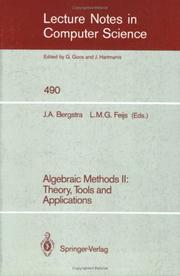
ISBN: 3540539123 3540463518 Year: 1991 Volume: vol 490 Publisher: Berlin Heidelberg Paris Springer-Verlag
Abstract | Keywords | Export | Availability | Bookmark
 Loading...
Loading...Choose an application
- Reference Manager
- EndNote
- RefWorks (Direct export to RefWorks)
The proper treatment and choice of the basic data structures is an important and complex part in the process of program construction. Algebraic methods provide techniques for data abstraction and the structured specification, validation and analysis of data structures. This volume originates from a workshop organized within ESPRIT Project 432 METEOR, An Integrated Formal Approach to Industrial Software Development, held in Mierlo, The Netherlands, September 1989. The volume includes five invited contributions based on workshop talks given by A. Finkelstein, P. Klint, C.A. Middelburg, E.-R. Olderog, and H.A. Partsch. Ten further papers by members of the METEOR team are based on talks given at the workshop. The workshop was a successor to an earlier one held in Passau, Germany, June 1987, the proceedings of which were published as Lecture Notes in Computer Science, Vol. 394.
Algebra --- -Computer software --- -681.3 *C2 --- 681.3*D1 --- 681.3*D2 --- 681.3*D3 --- 681.3*F3 --- Software, Computer --- Computer systems --- Mathematics --- Mathematical analysis --- Congresses --- Development --- -Congresses --- Computer communication networks: data communications; OSI; security and protection --- Programming techniques--See also {681.3*E} --- Software engineering: protection mechanisms; standards--See also {681.3*K63}; {681.3*K51} --- Programming languages --- Logics and meanings of programs (Theory of computation) --- Computer software --- Congresses. --- 681.3*F3 Logics and meanings of programs (Theory of computation) --- 681.3*D3 Programming languages --- 681.3*D2 Software engineering: protection mechanisms; standards--See also {681.3*K63}; {681.3*K51} --- 681.3*D1 Programming techniques--See also {681.3*E} --- 681.3 *C2 Computer communication networks: data communications; OSI; security and protection --- 681.3 *C2 --- Development&delete& --- Algebra. --- Mathematics. --- Data structures (Computer scienc. --- Software engineering. --- Computer science. --- Applications of Mathematics. --- Data Structures and Information Theory. --- Software Engineering. --- Programming Techniques. --- Programming Languages, Compilers, Interpreters. --- Informatics --- Science --- Computer software engineering --- Engineering --- Math
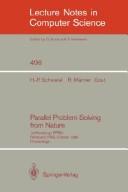
ISBN: 3540541489 3540706526 Year: 1991 Volume: vol 496 Publisher: Berlin New York Hong Kong Springer
Abstract | Keywords | Export | Availability | Bookmark
 Loading...
Loading...Choose an application
- Reference Manager
- EndNote
- RefWorks (Direct export to RefWorks)
With the appearance of massively parallel computers, increased attention has been paid to algorithms which rely upon analogies to natural processes. This development defines the scope of the PPSN conference at Dortmund in 1990 whose proceedings are presented in this volume. The subjects treated include: - Darwinian methods such as evolution strategies and genetic algorithms; - Boltzmann methods such as simulated annealing; - Classifier systems and neural networks; - Transfer of natural metaphors to artificial problem solving. The main objectives of the conference were: - To gather theoretical results about and experimental comparisons between these algorithms, - To discuss various implementations on different parallel computer architectures, - To summarize the state of the art in the field, which was previously scattered widely both among disciplines and geographically.
Computer architecture. Operating systems --- Neural networks (Computer science) --- -Parallel processing (Electronic computers) --- -681.3*C12 --- 681.3*I26 --- Congresses --- Multiple data stream architectures (multiprocessors): MIMD; SIMD; pipeline and parallel processors; array-, vector-, associative processors; interconnection architectures: common bus, multiport memory, crossbar switch --- Learning: analogies; concept learning; induction; knowledge acquisition; language acquisition; parameter learning (Artificial intelligence)--See also {681.3*K32} --- 681.3*I26 Learning: analogies; concept learning; induction; knowledge acquisition; language acquisition; parameter learning (Artificial intelligence)--See also {681.3*K32} --- 681.3*C12 Multiple data stream architectures (multiprocessors): MIMD; SIMD; pipeline and parallel processors; array-, vector-, associative processors; interconnection architectures: common bus, multiport memory, crossbar switch --- Parallel processing (Electronic computers) --- 681.3*C12 --- Parallel processing (Electronic computers) - Congresses. --- Neural networks (Computer science) - Congresses. --- Mathematics. --- Computer network architectures. --- Information theory. --- Computer science. --- Computer software. --- Applications of Mathematics. --- Computer System Implementation. --- Theory of Computation. --- Computation by Abstract Devices. --- Algorithm Analysis and Problem Complexity. --- Processor Architectures. --- Software, Computer --- Computer systems --- Informatics --- Science --- Communication theory --- Communication --- Cybernetics --- Architectures, Computer network --- Network architectures, Computer --- Computer architecture --- Math
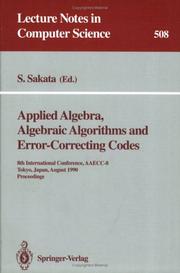
ISBN: 3540541950 3540474897 Year: 1991 Volume: vol 508 Publisher: Berlin New York Barcelona Springer-Verlag
Abstract | Keywords | Export | Availability | Bookmark
 Loading...
Loading...Choose an application
- Reference Manager
- EndNote
- RefWorks (Direct export to RefWorks)
The AAECC conferences focus on the algebraic aspects of modern computer science, which include the most up-to-date and advanced topics. The topic of error-correcting codes is one where theory and implementation are unified into a subject both of mathematical beauty and of practical importance. Algebraic algorithms are not only interesting theoretically but also important in computer and communication engineering and many other fields. This volume contains the proceedings of the 8th AAECC conference, held in Tokyo in August 1990. Researchers from Europe, America, Japan and other regions of the world presented papers at the conference. The papers present new results of recent theoretical and application-oriented research on applied algebra, algebraic algorithms and error-correcting codes.
Error-correcting codes (Information theory) --- -Algebra --- -Algorithms --- -681.3*E4 --- 681.3*F2 --- 681.3*I1 --- Algorism --- Algebra --- Arithmetic --- Mathematics --- Mathematical analysis --- Codes, Error-correcting (Information theory) --- Error-detecting codes (Information theory) --- Forbidden-combination check (Information theory) --- Self-checking codes (Information theory) --- Artificial intelligence --- Automatic control --- Coding theory --- Information theory --- Congresses --- Data processing --- -Congresses --- Coding and information theory: data compaction and compression; formal modelsof communication; nonsecret encoding schemes--See also {681.3*H11} --- Analysis of algorithms and problem complexity--See also {681.3*B6}; {681.3*B7}; {681.3*F13} --- Algebraic manipulation (Computing methodologies) --- Foundations --- 681.3*I1 Algebraic manipulation (Computing methodologies) --- 681.3*F2 Analysis of algorithms and problem complexity--See also {681.3*B6}; {681.3*B7}; {681.3*F13} --- 681.3*E4 Coding and information theory: data compaction and compression; formal modelsof communication; nonsecret encoding schemes--See also {681.3*H11} --- Algorithms --- 681.3*E4 --- Data processing&delete& --- Error-correcting codes (Information theory) - Congresses. --- Algebra - Data processing - Congresses. --- Algorithms - Congresses. --- Mathematics. --- Algebra. --- Information theory. --- Coding theory. --- Combinatorics. --- Applications of Mathematics. --- Theory of Computation. --- Coding and Information Theory. --- Symbolic and Algebraic Manipulation. --- Data processing. --- Combinatorics --- Data compression (Telecommunication) --- Digital electronics --- Machine theory --- Signal theory (Telecommunication) --- Computer programming --- Communication theory --- Communication --- Cybernetics --- Math --- Science
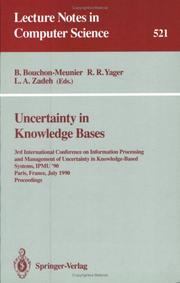
ISBN: 3540543465 0387543465 354047580X Year: 1991 Volume: vol 521 Publisher: Berlin New York Springer-Verlag
Abstract | Keywords | Export | Availability | Bookmark
 Loading...
Loading...Choose an application
- Reference Manager
- EndNote
- RefWorks (Direct export to RefWorks)
The management and processing of uncertain information has shown itself to be a crucial issue in the development of intelligent systems, beginning withits appearance in the such systems as Mycin and Prospector. The papers in this volume reflect the current range of interests or researchers in thefield. Currently, the major approaches to uncertainty include fuzzy set theory, probabilistic methods, mathematical theory of evidence, non-standardlogics such as default reasoning, and possibility theory. The initial part of the volume is devoted to papers dealing with the foundations of these approaches, where recent attempts have been made to develop systems combining multiple approaches. A significant part of the book looks at the management of uncertainty in a number of the paradigmatic domainsof intelligent systems such as expert systems, decision making, databases, image processing, and reasoning networks. The papers are extended versions of presentations at the third international conference on information processing and management of uncertainty in knowledge-based systems. The proceedings of the two preceding IPMU conferences appear as LNCS 286 and LNCS 313.
Database management --- Uncertainty (Information theory) --- -681.3*C3 --- 681.3*H11 --- 681.3*H4 --- 681.3*I2 --- Congresses. --- Congresses --- Special-purpose and application-based systems: microprocessor/microcomputer; process control-, real-time, signal processing systems (Computer systems organization)--See also {681.3*J7} --- Systems and information theory: value of information--See also {681.3*E4} --- Information systems applications (GIS etc.) --- Artificial intelligence. AI --- 681.3*I2 Artificial intelligence. AI --- 681.3*H4 Information systems applications (GIS etc.) --- 681.3*H11 Systems and information theory: value of information--See also {681.3*E4} --- 681.3*C3 Special-purpose and application-based systems: microprocessor/microcomputer; process control-, real-time, signal processing systems (Computer systems organization)--See also {681.3*J7} --- 681.3*C3 --- Uncertainty (Information theory) - Congresses. --- Data base management - Congresses. --- Artificial intelligence. --- Mathematics. --- Computer science. --- Distribution (Probability theory. --- Statistics. --- Artificial Intelligence. --- Applications of Mathematics. --- Information Systems Applications (incl. Internet). --- Models and Principles. --- Probability Theory and Stochastic Processes. --- Statistics, general. --- Statistical analysis --- Statistical data --- Statistical methods --- Statistical science --- Mathematics --- Econometrics --- Distribution functions --- Frequency distribution --- Characteristic functions --- Probabilities --- Informatics --- Science --- Math --- AI (Artificial intelligence) --- Artificial thinking --- Electronic brains --- Intellectronics --- Intelligence, Artificial --- Intelligent machines --- Machine intelligence --- Thinking, Artificial --- Bionics --- Cognitive science --- Digital computer simulation --- Electronic data processing --- Logic machines --- Machine theory --- Self-organizing systems --- Simulation methods --- Fifth generation computers --- Neural computers
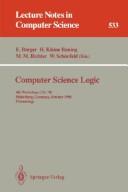
ISBN: 3540544879 0387544879 3540384014 Year: 1991 Volume: vol 533 Publisher: Berlin New York Springer-Verlag
Abstract | Keywords | Export | Availability | Bookmark
 Loading...
Loading...Choose an application
- Reference Manager
- EndNote
- RefWorks (Direct export to RefWorks)
The workshop Computer Science Logic '90 was held at the Max-Planck-Haus in Heidelberg, Germany, October 1-5, 1990. It was the fourth in a series of worskhops, following CSL '89 at the University of Kaiserslautern (see LNCS 440), CSL '88 at the University of Duisberg (see LNCS 385), and CSL '87 at the University of Karlsruhe (see LNCS 329). This volume contains 24 papers, chosen by means of a review procedure from the 35 papers presented at the workshop, some of which were invited and some selected from a total of 89 submissions. The papers cover a wide range of topics arising from the applications of logic to computer science.
681.3*H2 --- Computer science --- -Logic, Symbolic and mathematical --- -681.3*D3 --- 681.3*G2 --- 681.3*I2 --- Algebra of logic --- Logic, Universal --- Mathematical logic --- Symbolic and mathematical logic --- Symbolic logic --- Mathematics --- Algebra, Abstract --- Metamathematics --- Set theory --- Syllogism --- Informatics --- Science --- Database management: security; integrity; protection--See also {?681.5*E5} --- Congresses --- Programming languages --- Discrete mathematics (Mathematics of computing) --- Artificial intelligence. AI --- 681.3*I2 Artificial intelligence. AI --- 681.3*G2 Discrete mathematics (Mathematics of computing) --- 681.3*D3 Programming languages --- 681.3*H2 Database management: security; integrity; protection--See also {?681.5*E5} --- Logic, Symbolic and mathematical --- 681.3*D3 --- Logic [Symbolic and mathematical ] --- Computer science - Congresses. --- Logic, Symbolic and mathematical - Congresses. --- Logic, Symbolic and mathematical. --- Mathematics. --- Information theory. --- Logic design. --- Computer science. --- Computer software. --- Mathematical Logic and Foundations. --- Applications of Mathematics. --- Theory of Computation. --- Logics and Meanings of Programs. --- Mathematical Logic and Formal Languages. --- Algorithm Analysis and Problem Complexity. --- Software, Computer --- Computer systems --- Design, Logic --- Design of logic systems --- Digital electronics --- Electronic circuit design --- Logic circuits --- Machine theory --- Switching theory --- Communication theory --- Communication --- Cybernetics --- Math
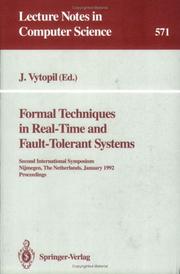
ISBN: 3540550925 0387550925 3540466924 Year: 1991 Volume: vol 571 Publisher: Berlin New York Springer-Verlag
Abstract | Keywords | Export | Availability | Bookmark
 Loading...
Loading...Choose an application
- Reference Manager
- EndNote
- RefWorks (Direct export to RefWorks)
This book presents state-of-the-art research results in the area of formal methods for real-time and fault-tolerant systems. The papers consider problems and solutions in safety-critical system design and examine how wellthe use of formal techniques for design, analysis and verification serves in relating theory to practical realities. The book contains papers on real-time and fault-tolerance issues. Formal logic, process algebra, and action/event models are applied: - to specify and model qualitative and quantitative real-time and fault-tolerant behavior, - to analyze timeliness requirements and consequences of faulthypotheses, - to verify protocols and program code, - to formulate formal frameworks for development of real-time and fault-tolerant systems, - to formulate semantics of languages. The integration and cross-fertilization of real-time and fault-tolerance issues have brought newinsights in recent years, and these are presented in this book.
681.3*G3 --- Fault-tolerant computing --- -Real-time data processing --- -681.3*B13 --- 681.3*F12 --- 681.3*F3 --- 681.3*F43 --- Fast-response data processing --- High-speed data processing --- Electronic data processing --- Computing, Fault-tolerant --- Electronic digital computers --- Fault tolerance (Engineering) --- Computer system failures --- Probability and statistics: probabilistic algorithms (including Monte Carlo);random number generation; statistical computing; statistical software (Mathematics of computing) --- Congresses --- Control structure reliability, testing and fault-tolerance: diagnostics, error-checking, redundant design, test generation --- Modes of computation: alternation and nondeterminism; parallelism; probabilistic computation; relations among modes; relativized computation --- Logics and meanings of programs (Theory of computation) --- Formal languages: algebraic language theory; classes defined by grammars or automata or by resource-bounded automata; operations on languages (Mathematical logic and formal languages)--See also {681.3*D31} --- Reliability --- Real-time data processing --- Congresses. --- 681.3*F43 Formal languages: algebraic language theory; classes defined by grammars or automata or by resource-bounded automata; operations on languages (Mathematical logic and formal languages)--See also {681.3*D31} --- 681.3*F3 Logics and meanings of programs (Theory of computation) --- 681.3*F12 Modes of computation: alternation and nondeterminism; parallelism; probabilistic computation; relations among modes; relativized computation --- 681.3*B13 Control structure reliability, testing and fault-tolerance: diagnostics, error-checking, redundant design, test generation --- 681.3*G3 Probability and statistics: probabilistic algorithms (including Monte Carlo);random number generation; statistical computing; statistical software (Mathematics of computing) --- 681.3*B13 --- Real-time data processing - Congresses. --- Fault-tolerant computing - Congresses. --- Information theory. --- Mathematics. --- Logic, Symbolic and mathematical. --- Logic design. --- Distribution (Probability theory. --- Statistics. --- Theory of Computation. --- Applications of Mathematics. --- Mathematical Logic and Foundations. --- Logics and Meanings of Programs. --- Probability Theory and Stochastic Processes. --- Statistics, general. --- Statistical analysis --- Statistical data --- Statistical methods --- Statistical science --- Mathematics --- Econometrics --- Distribution functions --- Frequency distribution --- Characteristic functions --- Probabilities --- Design, Logic --- Design of logic systems --- Digital electronics --- Electronic circuit design --- Logic circuits --- Machine theory --- Switching theory --- Algebra of logic --- Logic, Universal --- Mathematical logic --- Symbolic and mathematical logic --- Symbolic logic --- Algebra, Abstract --- Metamathematics --- Set theory --- Syllogism --- Math --- Science --- Communication theory --- Communication --- Cybernetics
| Listing 1 - 9 of 9 |
Sort by
|

 Search
Search Feedback
Feedback About UniCat
About UniCat  Help
Help News
News